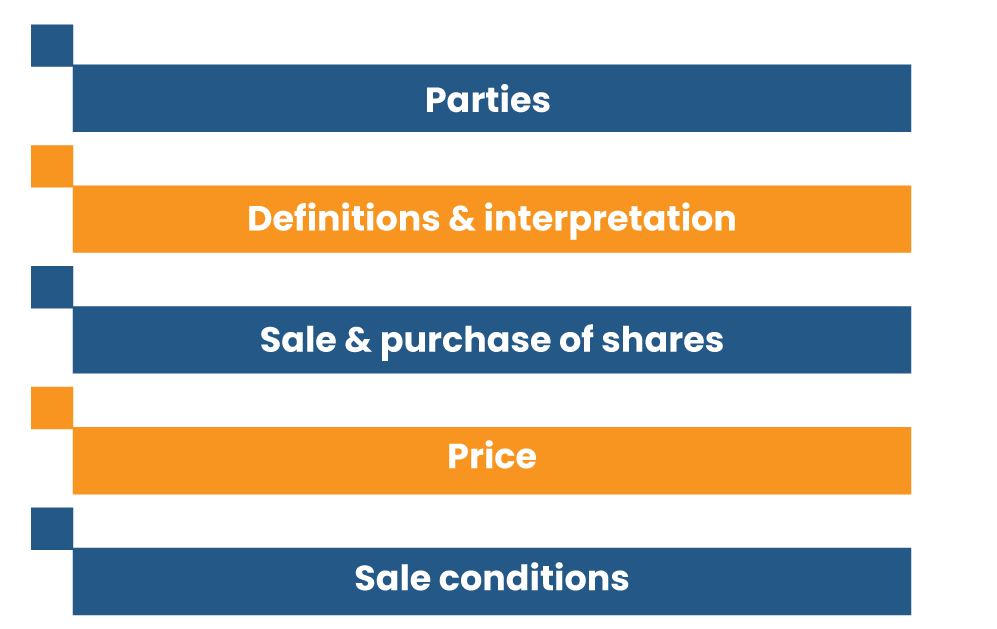When it comes to acquiring & selling businesses, one of the most convenient ways to transfer ownership is to sell out the company’s share. This is because while the business ownership may change, the daily activities of the business continue, with workforce, contracts & property staying with the company. When somebody sells their business shares, they often expect to accomplish a clean break. However, this is impractical in the real world as most of the firm tends to cover up their tax liabilities while transferring the ownership to another party. The non-disclosure of tax liabilities during the transaction could disrupt the buyer’s growth in the future. Fortunately, with the help of a share purchase agreement, you can keep such a threat at bay.
While it is viable to alter to template SPA, involving corporate lawyers to draft & negotiate the share purchase agreement keeps the possible anomalies at the bay that may disrupt the buyer-seller relationship in the future. With the lawyer’s help, you can also protect yourself against stressful post-sale discoveries & liabilities.
What is a Share Purchase Agreement?
A share purchase agreement (SPA) is the contract that is primarily used in the private sale of shares.
The SPA will:
- Enclose the briefing on the main commercial terms related to the transaction, such as sale price, buyer and seller info, and what shares are being sold), & the obligations of the parties regarding the sale.
- Enclose the key business details and ensure buyer’s protection.
- Enclose confidentiality terms & protections for the buyer against competition from the seller in the post-sale phase.
- Outlines any terms related to the sale such as the buyer availing licensing permissions to undertake business activities.
- During the share transaction process, a SPA is drafted by the buyer’s legal associates. It is the buyer who mostly cares about repercussion of SPA on his/her business journey.
Where a firm is being sold out at auction, the seller’s advocate will generally draft a share purchase agreement & make this accessible for the investigation to interested bidders. Following the negotiation of the provisions & the inspection process, the parties each render their approval by signing the SPA. The buyer pays the cost, and the shares are officially transferred to the buyer via a stock transfer form. Typically this happens on the same day.
Read our article:Drafting of Share Purchase Agreement: Underlining the Important Clauses
Essential Clauses in Share Purchase Agreement that seeks Professional Attention
A share purchase agreement is usually descriptive and contains a primary document & multiple schedules or annexes enclosing terms and detail of the transaction. While a Share Purchase Agreement can be in various formats, the following are the most vital clauses and should be prepared by well-versed professionals.


Parties
At the inception of the SPA, the seller and buyer identity are described. Where multiple shareholders own the firm, it is vital for the buyer to ensure that each seller is accountable for the entire liabilities, or if this isn’t the scenario, how the liability’s distribution between respective sellers will be allocated.
At times, there might be other parties (bank or Group Company) to the document that claims to cover the seller’s obligations. The firm being sold can also be turned into a party, for instance, where property of a business is being transferred in or out of the selling firm as part of the deal.
Definitions & interpretation
Defined terms simplify the document & certain words, for instance, what is meant by IPR or’ confidential information’. Clarifying terms up-front helps avert potential disputes about what these mean. The ‘interpretations’ play a pivotal role in defining how certain phrases ought to be interpreted in law.
Sale & purchase of shares
At the core of the SPA is the agreement that the buyer will purchase, and the seller will sell, the share of the target company. Typically, the seller agrees to transfer the shares “with full title guarantee’ that implies that the seller owns the shares outright, they held the right to dispose of them, that they would leverage every method to carry out the transfer to the buyer, & that the shares are not exposed to any limitations or third-party rights.
Price
A SPA should reflect the share’s selling price, what currency will be used for a transaction, time period, and other conditions such as partial payment related to firm performance. General, the transaction is completed in cash, albeit at times the buyer may offer some of its own shares to the seller or issue loan notes to the seller. Such matters are handled by the professional, in general.
Sale conditions
Typically, the share transaction process is completed in a single day after the preparation of the SPA.
At times, there may be a lag between contract exchange & deal completion, especially when there are terms to be fulfilled before the sale can occur.
In such scenarios, it is vital to supervise the whole process via a legal professional as they can help in describing the conditions and managing the delay in the transaction between signature & completion.
Other Important Areas to Look Upon While Drafting Share Purchase Agreement
- Where the buyer or seller is a publically-held company, outlining terms may require that they get shareholder’s approval to the transaction.
- If the business is operating globally, you might need to avail clearance from the respective government[1] avenues.
- The buyer may need licensing or regulatory approval to the purchase, for instance, if the business carries out its operation in a sector such as banking or insurance.
- Selling shares is typically simpler than selling a business asset; for major business contracts to remain intact after the sale like leases, the landlord’s approval & other third-parties may be required.
Conclusion
Hiring an advocate to draft a share purchase agreement is rather a proactive move as it helps keep the legal complications at bay and impart transparency in the contract. Since there is much legality involved in SPA, it is advisable to consider the aforementioned factors carefully.
Read our article:What is Share Purchase Agreement in NBFC?











